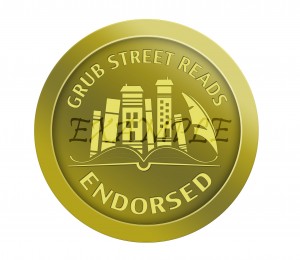The following is a guest post by Jessica of Grub Street Reads. For a previous debate on the quality issue in self-publishing, see How Should We Ease “Self-Publishing Gridlock?.
 Let me start out by saying that I love self-published authors.
Let me start out by saying that I love self-published authors.
I am a self-published author.
I know that there are troves and troves of good self-published books on the market.
I know this last part, because over the last six months I’ve been reading a lot of self-published novels (more on that later).
So, please know that I’m not a malcontent or some anachronistic book lover pining for the old days where the traditional publishers pretty much kept the market under lock and key.
Self-Publishing’s Image Problem
That said, we self-publishers have a big image problem, and it’s not exactly unearned.
There are a lot of poor quality self-published books on the market (I like to think of them as “rough drafts”). The numbers are just getting bigger and bigger as authors realize how easy and potentially lucrative it is to publish on Amazon, Barnes & Noble, Smashwords, The Apple Store, Kobo, etc…
Here’s a little numbers therapy from Smashwords, the online mecca of self-publishing.
In 2009, the company reported that 6,000 books were published through Smashwords. In 2010 that number rose to 28,800, and in 2011 it skyrocketed to over 92,000. That’s more than a 200% increase in books released through Smashwords between 2009 and 2010 and over a 300% increase from 2010 to 2011.
We obviously don’t have stats for 2012 yet, but my guess that the numbers are going to go the way of Willy Wonka’s glass elevator – up and through the roof.
Empowered Authors = Good
With the publishing floodgates open, many authors are finally achieving the dream of publishing their opus, or multiple opuses (or is it opie?).
On one side of the coin, this is a good thing. No more offices papered with rejections from agents and publishers. No more measly royalty rates, terrible covers, and books being pulped because they didn’t get traction within the first two weeks of their launch.
On the flip side, a flood is still a flood. If there are no quality standards in place, we’re going to see a lot of muck settle at the bottom, crowding out quality books, scaring away readers and gumming everything up.
Iffy Quality = Bad
To some of you, this may seem like a harsh assessment.
I get that. Self-publishing is all about freedom, and I don’t want to take that away. But, I suspect a lot of you may be nodding your heads, especially if you’ve stumbled upon a few choice examples of self-published books that are still in the “rough draft” stage.
Our Solution
 My business partner, Leslie Ramey, and I might just have a solution to self-publishing’s image crisis.
My business partner, Leslie Ramey, and I might just have a solution to self-publishing’s image crisis.
Together, we’ve formed Grub Street Reads. We evaluate self-published novels and endorse those that meet our strict quality standard, based on the fundamental components of good storytelling. This includes basics like well-developed characters, a clear and compelling plot, strong pacing, accuracy/consistency of details and polished grammar and layout.
We believe our standard can be fairly and consistently applied to any genre of fiction and creative non-fiction, and we’ve configured it to represent the basic bar that we believe every book should meet before going to market.
The goal of the Grub Street Reads Endorsement is to spotlight quality self-published novels so that they can get the recognition and readership that they deserve.
Why GSR Rocks
We believe a quality standard is what the self-publishing industry needs in order to protect readers, to protect authors, and to help elevate the reputation of self-publishing.
We know that we won’t convert everyone right away. That’s fine. We’re willing to work to prove ourselves, and to let the trends of the self-publishing market help us out.
As the number of self-published books entering the market continues to explode, the need for a standard will only become greater as both authors and readers struggle for order. Remember our name – Grub Street Reads – you’ll be hearing a lot more from us!
Talk Back!
Let the debate begin. Do you think the self-publishing industry is in desperate need of a quality standard? Are we, Grub Street Reads, the ones to do it? We welcome respectful discussion, even if you don’t agree with us.
Post your comments below and let’s see where Duolit readers are at!
To learn more about our company, take a stroll down Grub Street. You can watch the kooky video on our homepage, read all about our evaluation process and endorsement standards (we’re very open about our criteria), and visit our growing library of endorsed self-published books. The last thing I want to clarify is that Grub Street Reads is a paid service. We don’t hide that. Authors pay to submit their manuscript for evaluation. Our costs depend on the length of the manuscript and help compensate our trained evaluators for their reading time. Payment does not guarantee an endorsement. The GSR Endorsement Seal is not for sale.
 We're
We're 








